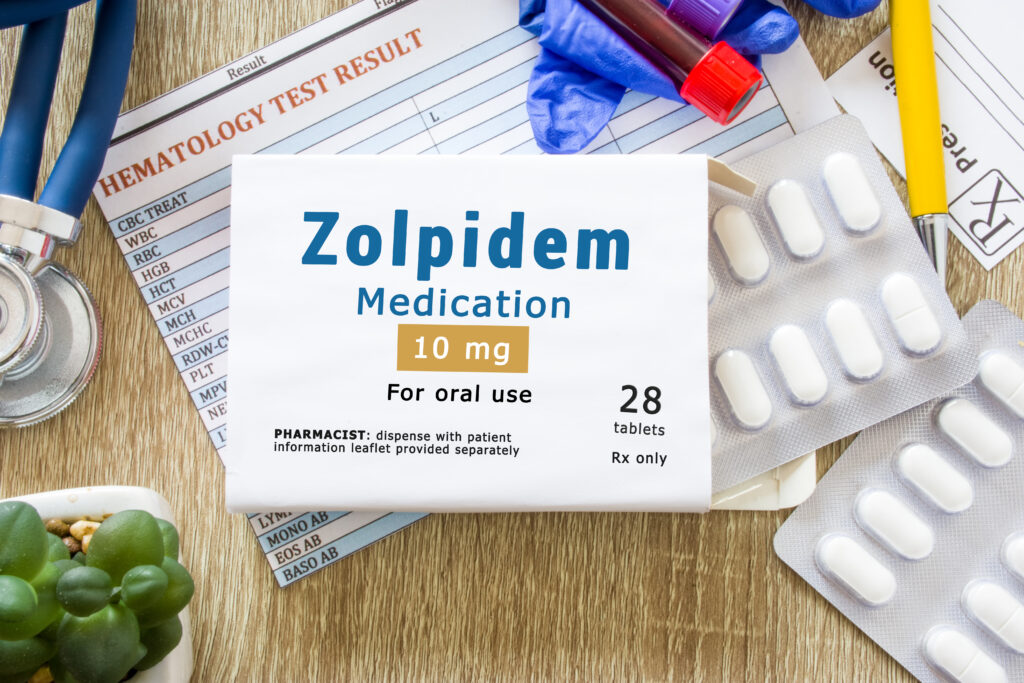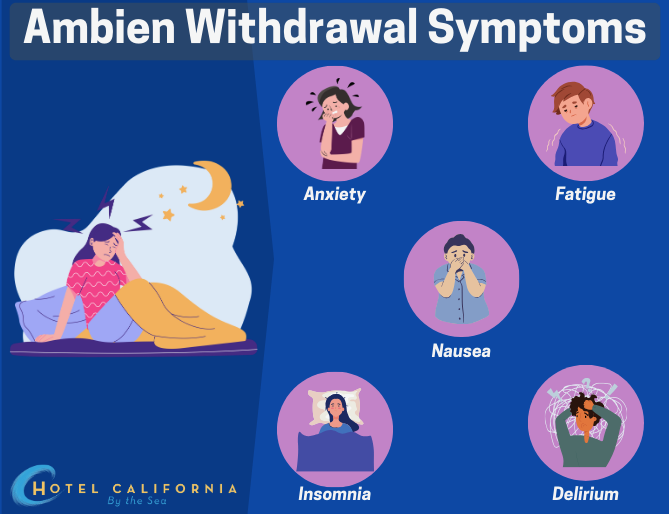Ambien Withdrawal Symptoms
Ambien is a non-benzo sedative-hypnotic that is an FDA-approved medication prescribed for the short-term management of insomnia and other types of sleep disorders. Ambien can also be sold under the generic name zolpidem. It was initially regarded as a safer alternative to benzos and generally considered safer than other sedative medications. Now, clinical evidence shows long-term use and excessive use of Ambien can lead to the development of dependence and the experience of dangerous withdrawal symptoms.

Sedative hypnotics work by depressing the central nervous system and slowing down brain activity. With prolonged use or when abused, hypnotic drugs can produce withdrawal symptoms after an abrupt discontinuation of the drug. Misuse can occur in all central nervous system depressant drugs and usually occurs when you take your medication in a way that is not prescribed by your medical provider, when you take someone else’s medication or when you take the medications for the sole purpose of getting high.
In recent studies, researchers found a rise in abuse of Ambien leading to physical and psychological dependence. Dependence occurs when the body has adapted to the presence of Ambien and will need it to perform daily everyday functions. Abrupt cessation of Ambien after high or excessive doses leads to the development of withdrawal symptoms. In fact, going cold turkey from sedative-hypnotics can cause dangerous withdrawal effects.
What is Ambien
Ambien is not intended for long-term management of sleep disorders. When using Ambien, users will experience an increase in neurochemicals called GABA. When GABA chemicals are increased in the brain, users feel a sense of calm and deep relaxation. This is helpful for those who have difficulty sleeping and suffer from sleep disturbances. It was once viewed as a safer alternative to benzo medications. However, research has found that it can contribute to the development of dangerous side effects such as seizures and delirium. In more recent years, the World Health Organization has considered the frequency of Ambien abuse and dependence as similar to that of benzo abuse and dependence.
A rise in abuse of the drug due to increased prescription rates has coincided with a rise in hospital admissions related to side effects from Ambien dependence. Some of the most concerning effects include psychotic episodes and visual hallucinations. Research has also found that Ambien can increase the potential for drug abuse even among users who do not have a history of drug abuse.
Taking large doses of Ambien for more than a few weeks can put you at risk of developing dependence and experiencing withdrawal symptoms when drug use has stopped. Ambien dependence occurs when the body needs the drug in order to feel normal and function properly. Eventually, the user will develop a tolerance and need a higher dose in order to experience the same effects.

Adverse Effects of Ambien Abuse
- Suicidal ideation
- Abnormal thinking and behavior
- Cognitive impairment
- Rebound insomnia
- Vertigo
- The feeling of intoxication
- Increased heart rate
- Headache
- Abdominal pain
- Amnesia
- Flu-like symptoms
- Anxiety and depression or worsening of mental health conditions
- Mood swings
- Body aches
- Nightmares
- Nausea and vomiting
- Seizures
Ambien Withdrawal Symptoms
Ambien withdrawal symptoms usually occur when drug use is abruptly stopped or drastically decreased. Some recent case studies have shown that withdrawal symptoms are commonly found among long-term use users of Ambien. According to the medication label, an estimated 1% of people who take a therapeutic dose of the drug as prescribed by a medical provider, can still experience withdrawal symptoms.
- Rebound insomnia
- Anxiety
- Confusion and panic attacks
- Mood swings
- Cognitive impairment
- Sleep disturbances and restlessness
- Drug cravings
- Delirium – a state of confusion defined by disorientation, agitation, hallucinations and difficulty focusing
- Headaches
- Nausea and vomiting
- Sweating
- Tremors
- Muscle aches
- Seizures
- Slurred speech
- Hyperventilation and racing pulse
Check Your Insurance Coverage for FREE
Find out if your insurance covers addiction treatment in minutes. We accept most insurance!
Ambien Withdrawal Timeline
The intensity and duration of withdrawal symptoms are dependent on several factors. Some factors include the length of Ambien use, the dosage of the drug, individual physiology, whether or not the medication was used alongside other mind-altering substances and the presence of any co-occurring mental health disorders.
Ambien withdrawal usually occurs within 48 hours after the last dose and should generally subside within a few weeks. Ambien has a shorter half-life of 2.5 hours compared to other similar drugs. On the first few days, the user may experience symptoms of rebound insomnia, anxiety, restlessness and mood swings. These symptoms often start off intensely. Many people experience the most severe symptoms within 3-5 days after drug cessation. They can also experience symptoms that include confusion, tremors, vomiting and nausea.
During the following weeks up to four, users can continue to experience sleep problems, fatigue, irritability, sweating, muscle aches and headaches, as the symptoms begin to peak and slowly fade. In rare or severe cases of dependence, lingering side effects such as insomnia, anxiety and depression can occur for several months after stopping drug use and is often referred to as post-acute withdrawal syndrome.
Treatment for Ambien Withdrawal Symptoms
Because suddenly decreasing or cessation of Ambien can cause mild to severe withdrawal symptoms, it is generally recommended to taper off the medication. Tapering off medication involves gradually reducing medication dosage over a period of time until the patient has completely cut off all medication. This is typically done under the guidance of a medical professional or in a medical clinic. Tapering helps to minimize the severity of withdrawal effects to help patients safely transition off the medication.
Medication management can be used to help treat withdrawal symptoms. Gabapentin can be prescribed to treat anxiety and rebound insomnia. Trazodone can also be prescribed to help with sleep troubles. Some providers recommend taking melatonin to help regulate the patient’s sleep cycle. Anti-depressants can be prescribed to manage symptoms of anxiety and depression. Sometimes beta-blockers can also be used to treat symptoms of anxiety. Other types of sedatives such as Klonopin, antipsychotics and anticonvulsants may also be prescribed to help with withdrawal symptoms.
Reach out to Hotel California by the Sea
We specialize in treating addiction and other co-occurring disorders, such as PTSD. Our Admissions specialists are available to walk you through the best options for treating your addiction.
Treatment of Substance Use Disorder
Ambien is prescribed for short-term use and treatment of insomnia and other types of sleep disorders. Taking a regular therapeutic dose can be safe and effective with little risk of experiencing withdrawal. The risk for severe and prolonged withdrawal symptoms typically occurs when a user takes high doses over a longer period of time. Ambien abuse is more likely seen in people who have a history of recreational drug use and pleasure-seeking through drug use. Ambien can cause tolerance, dependence and addiction. Some studies have shown that long-term abuse of Ambien has been linked to the development of memory impairment and even dementia.
Professional behavioral health treatment programs such as Hotel California by the Sea provide specialized treatments for those who are abusing sedative prescription medications such as Ambien. Our program offers detox, residential, PHP and IOP. Our clients have access to evidence-based treatment methods such as CBT, DBT, EMDR therapy and family therapy. Hotel California by the Sea is dedicated to helping all clients achieve sobriety and overcome their addictions.
References:
https://www.addictioncenter.com/sleeping-pills/ambien/withdrawal-detox
https://pmc.ncbi.nlm.nih.gov/articles/PMC10658757
https://www.verywellmind.com/ambien-withdrawal-4685927
https://www.alternativetomeds.com/blog/ambien
https://zinniahealth.com/substance-use/ambien/withdrawal
https://vertavahealth.com/ambien/withdrawal/
